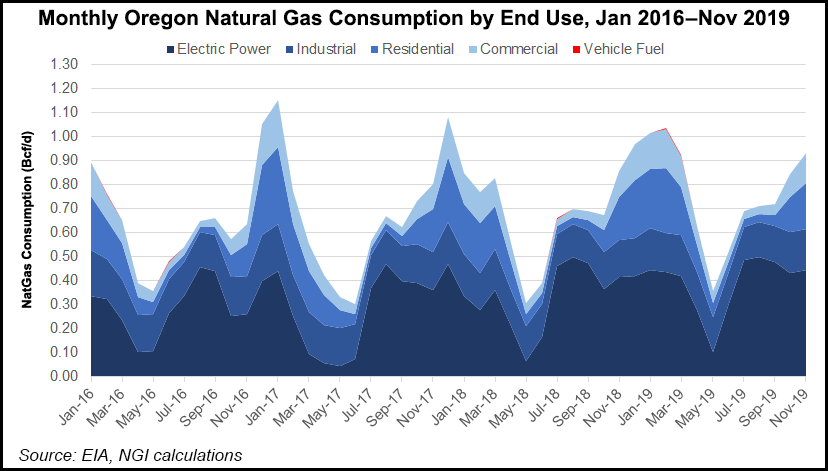NGI The Weekly Gas Market Report | Infrastructure | NGI All News Access
Oregon Utility Betting Future on Renewable Natural Gas
Portland, OR-based NW Natural has declared it is all in for renewable natural gas (RNG) and will begin purchasing RNG supplies for its residential and business customers later this year.

A cosponsor of last year’s American Gas Association (AGA) Foundation report compiled by a subsidiary of ICF International Inc., NW Natural is focused on the regulatory steps to implement a state law passed last year (Senate Bill 98) allowing the gas-only utility to acquire RNG for homes and businesses under a price limit to ensure affordability.
Citing the ICF report and a similar one completed two years ago by Oregon’s Department of Energy, NW Natural CEO David Anderson said the ICF/AGA report concluded that there is enough supply that can be “produced at a competitive cost using known technologies” to meet a 95% reduction in emissions associated with natural gas use from the residential sector.
“As we work together to reach our climate goals, we need both the electric and the natural gas systems to decarbonize and innovate,” Anderson said. “We can’t afford to leave any solution off the table, and this [ICF] study clearly shows the crucial role that the existing gas network can play.”
Oregon’s largest gas distribution utility is following the lead in promoting decarbonization and even electrification strategies as needing the existing natural gas systems. Anderson remarked that renewable supply and technology exists now, along with “a tight, modern delivery system, so our focus is to drive these new innovations forward for a substantial climate benefit.”
He said NW Natural plans to help “close the loop” on waste and put homegrown RNG into its pipeline system to be delivered to the transportation sector through several projects this year. Those include at the City of Portland wastewater treatment plant and a metropolitan wastewater management commission plant in Lane County, along with a privately developed large digester project in the state.
“When you combine lower use from efficiency with RNG and renewable hydrogen, you now have a pathway to carbon neutrality in the gas system,” said Kim Heiting, NW Natural senior vice president of operations. “There is a lot of work to do, but these innovations can transform the way we use our existing infrastructure.”
Meanwhile, earlier this month, a 12-state regional study of the Northeast and Mid-Atlantic from Virginia to Maine showed RNG can be an important means of slashing greenhouse gas (GHG) emissions. Advisory group M.J. Bradley & Associates evaluated GHG emissions scenarios in medium- and heavy-duty on-road vehicles, and residential and commercial heating, concluding that renewable biofuels, RNG and biomass-based diesel could significantly reduce GHG emissions that electrification and efficiency measures alone don’t reach.
“The report demonstrates that even aggressive efforts to electrify transportation and heating will need to be matched with aggressive adoption of RNG,” said Johannes Escudero, CEO of the Coalition for Renewable Natural Gas. “We are poised to deliver increasing volumes of RNG to meet the needs of Northeastern and Mid-Atlantic customers while driving down GHG emissions.”
© 2024 Natural Gas Intelligence. All rights reserved.
ISSN © 1532-1231 | ISSN © 2577-9877 | ISSN © 1532-1266 |
